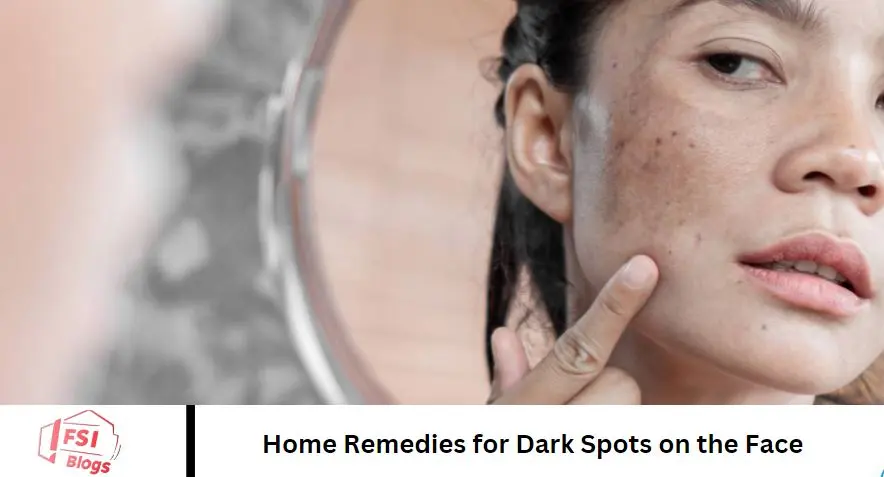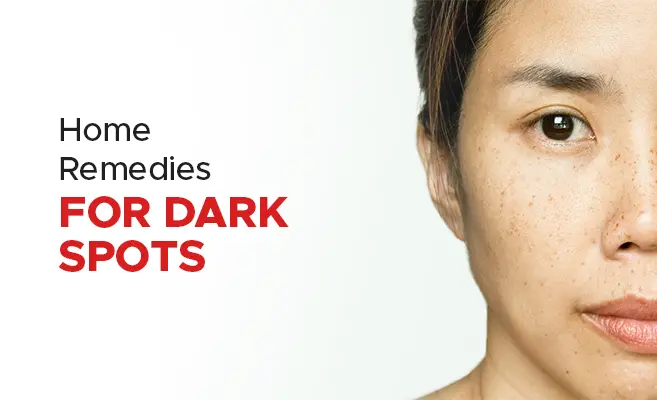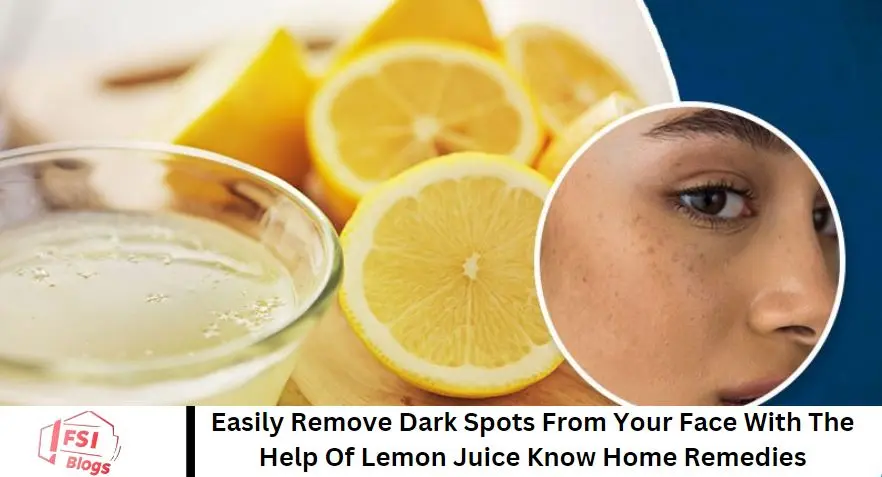Dark spots on the face can be bothersome, but natural remedies can help alleviate them, such as lemon juice. Lemon juice is renowned for its natural bleaching properties, making it a popular choice for reducing hyperpigmentation and dark spots. This citrus fruit contains citric acid, which gently exfoliates the skin and helps lighten dark areas.
To use lemon juice effectively, apply fresh lemon juice directly onto the affected areas using a cotton ball or your fingertips. Allow it to sit for 10-15 minutes before rinsing off with lukewarm water. Lemon juice can make your skin sensitive to sunlight, so applying sunscreen is advisable if you plan to go outside after treatment.
Other home remedies, such as aloe vera, apple cider vinegar, and green tea extracts, can also help lighten dark spots. These natural ingredients work in various ways to promote skin rejuvenation and even out skin tone.
By incorporating these simple yet effective home remedies into your skincare routine, you can gradually reduce the appearance of dark spots and achieve a more transparent, more radiant complexion.
What are the Causes of Dark Spots on the Face?
Dark spots on the face, also known as hyperpigmentation, can have various causes. Here are some common ones:
- Sun Exposure: UV rays stimulate melanin production in the skin, forming dark spots over time. This is often referred to as sunspots or solar lentigines.
- Hormonal Changes: Pregnancy, hormonal therapies like birth control pills, and hormonal imbalances can trigger melanin production, causing dark patches known as melasma. This type of hyperpigmentation often appears on the cheeks, forehead, or upper lip.
- Inflammation: Skin injuries, acne, or other inflammatory conditions can leave dark marks as the skin heals. This is known as post-inflammatory hyperpigmentation (PIH).
- Age: As we age, skin cell turnover slows down, leading to a buildup of melanin in certain areas, resulting in age spots or liver spots.
- Genetics: Some individuals are genetically predisposed to developing dark spots due to increased melanin production or skin sensitivity to various triggers.
- Medication: Certain medications, such as chemotherapy drugs, can cause skin hyperpigmentation as a side effect.
- Skin Care Products: Harsh chemicals or improper use of skin care products can irritate the skin, leading to darkening specific areas.
Understanding the cause of dark spots is crucial for selecting the appropriate treatment or prevention methods. In many cases, a combination of sun protection, gentle exfoliation, and targeted skincare products can help reduce and prevent the appearance of dark spots on the face.
May you also like it:
WellHealthOrganic How to Build Muscle and Increase Muscle Growth Tips in Hindi
Home Remedies for Dark Spots on the Face

Here are some effective home remedies for dark spots on the face:
- Lemon Juice: Lemon juice’s natural bleaching properties can lighten dark spots. Apply fresh lemon juice directly to the affected areas using a cotton ball, leave it on for 10-15 minutes, and rinse off with lukewarm water. Use sunscreen afterward, as lemon juice can increase skin sensitivity to sunlight.
- Apple Cider Vinegar: Rich in acetic acid, apple cider vinegar helps exfoliate the skin and lighten dark spots. Mix equal parts of apple cider vinegar and water, apply to dark spots using a cotton ball, leave it for a few minutes, then rinse off. Repeat daily for best results.
- Aloe Vera: Known for its soothing and healing properties, aloe vera gel can help fade dark spots. Apply fresh aloe vera gel directly to the spots, leave it on for 30 minutes, then rinse off. Repeat twice daily.
- Green Tea Extract: Green tea contains antioxidants that can help lighten dark spots and even skin tone. Brew a cup of green tea, let it cool, then apply it to your face using a cotton ball. Leave it on for 10-15 minutes, then rinse with water. Repeat daily.
- Yogurt and Oatmeal Mask: Mix 2 tablespoons of plain yogurt with 1 tablespoon of oatmeal to create a paste. Apply the mixture to your face, focusing on dark spots, and leave it on for 20-30 minutes before rinsing off with water. Yogurt contains lactic acid, which helps exfoliate and lighten skin, while oatmeal soothes and moisturizes.
- Turmeric Paste: Turmeric has anti-inflammatory and antioxidant properties that can help reduce dark spots. Mix 1-2 teaspoons of turmeric powder with enough milk or water to paste. Apply to dark places, leave it on for 15-20 minutes, then rinse with water.
- Potato Slices: Potatoes contain enzymes and vitamin C that can help lighten dark spots. Cut a potato into thin slices and place them directly on the affected areas. Leave them on for 10-15 minutes, then rinse with water.
These home remedies can effectively reduce the appearance of dark spots on the face over time. Consistency and patience are essential, as results may vary depending on the severity of the dark spots and individual skin type.
Types of Dark Spots
Dark spots on the face can manifest in various forms, each with its underlying causes and characteristics. Here are the common types of dark spots:
Sunspots (Solar Lentigines):
- Cause: Prolonged exposure to UV rays from the sun triggers melanin production, resulting in localized dark spots, commonly in areas exposed to the sun.
- Appearance: Small to medium-sized, flat, and usually light to dark brown.
Melasma:
- Cause: Hormonal changes, such as pregnancy, birth control pills, or hormone replacement therapy, stimulate melanin production, leading to patchy dark spots.
- Appearance: Larger, irregularly shaped patches of darkened skin, typically on the cheeks, forehead, upper lip, and chin.
Post-Inflammatory Hyperpigmentation (PIH):
- Cause: Inflammatory skin conditions like acne, eczema, or skin injuries lead to excess melanin production during healing.
- Appearance: Darkened patches or spots that appear after the initial inflammation or injury has healed, varying in size and intensity depending on the severity of the initial condition.
Age Spots (Liver Spots):
- Cause: Accumulation of melanin due to aging and long-term sun exposure.
- Appearance: Small, flat, round, or oval-shaped spots, usually light to dark brown. They are commonly found in areas frequently exposed to the sun, such as the face, hands, shoulders, and arms.
Freckles:
- Cause: Genetic predisposition and exposure to sunlight trigger melanin production, resulting in small, concentrated pigmentation clusters.
- Appearance: Small, flat, and light to dark brown spots, often more noticeable in fair-skinned individuals, particularly on sun-exposed areas like the face.
Understanding the type of dark spots you have can help determine the appropriate treatment or prevention methods. It’s essential to consult with a dermatologist for a proper diagnosis and personalized skincare regimen tailored to your specific needs.
Dermatologist Advised 10 Home Remedies That Actually Work
Here are 10 home remedies that dermatologists often recommend for various skin concerns, including dark spots:
- Lemon Juice: Contains natural bleaching properties that can lighten dark spots. Apply fresh lemon juice to affected areas, leave on for 10-15 minutes, then rinse off.
- Apple Cider Vinegar: Helps exfoliate the skin and lighten dark spots. Dilute with equal parts water, apply to spots using a cotton ball, leave on for a few minutes, then rinse off.
- Aloe Vera: Soothes and promotes healing. Apply fresh aloe vera gel directly to dark spots, leave on for 30 minutes, then rinse off.
- Green Tea Extract: Rich in antioxidants that lighten dark spots and even skin tone. Apply cooled green tea to the face using a cotton ball, leave on for 10-15 minutes, then rinse off.
- Yogurt and Oatmeal Mask: Mix yogurt with oatmeal to create a paste. Apply to face, focusing on dark spots, leave on for 20-30 minutes, then rinse off.
- Turmeric Paste: Has anti-inflammatory and antioxidant properties. Mix turmeric powder with water or milk to form a paste. Apply to dark spots, leave on for 15-20 minutes, then rinse off.
- Potato Slices: Contains enzymes and vitamin C to lighten dark spots. Place thin potato slices directly on spots, leave on for 10-15 minutes, then rinse off.
- Honey: Natural humectant with antibacterial properties. Apply honey to dark spots, leave on for 20-30 minutes, then rinse with warm water.
- Rosehip Seed Oil: Rich in vitamins and antioxidants that promote skin regeneration. Apply a few drops to dark spots and massage gently into the skin.
- Licorice Extract: Contains glabridin, which helps lighten dark spots. Apply licorice extract directly to spots or look for skincare products containing licorice extract.
These remedies can be effective in treating dark spots, but results may vary depending on the severity of the condition and individual skin type. It’s important to patch-test new ingredients and consult a dermatologist for personalized advice, especially if you have sensitive skin or underlying skin conditions.
Do these home remedies work every time?
While DIY solutions like those mentioned can improve the appearance of dark spots for some individuals, results may vary due to skin type, degree of pigmentation, and individual health considerations. Skin’s response to treatments can differ significantly from person to person.
It’s important to note that these remedies typically require consistent application over time for noticeable results, and immediate improvement is not guaranteed. Patience and regularity are critical virtues in achieving desired outcomes.
If no visible improvement occurs or any adverse reactions arise, seeking guidance from a dermatologist is crucial. Professional consultation helps mitigate the risk of potential skin damage and ensures that appropriate treatment plans are tailored to individual needs.
General Tips for Dark Spot Reduction

Reducing dark spots on the skin requires a consistent approach and careful attention to skincare practices. Here are some general tips that can help:
- Sun Protection: Use sunscreen daily with SPF 30 or higher, even on cloudy days. UV exposure can worsen dark spots and hinder their fading progress.
- Gentle Cleansing: Cleanse your face twice daily with a mild cleanser suitable for your skin type. Avoid harsh scrubs that can irritate the skin and worsen pigmentation.
- Exfoliation: Incorporate gentle exfoliation into your skincare routine 1-2 times weekly to remove dead skin cells and encourage cell turnover. This can help fade dark spots over time.
- Topical Treatments: Look for skincare products containing ingredients like vitamin C, niacinamide, retinoids, or alpha hydroxy acids (AHAs), which can help lighten dark spots and even skin tone.
- Avoid Irritants: Avoid using harsh chemicals or products that cause skin irritation, which can exacerbate pigmentation issues.
- Hydration: Use a moisturizer suitable for your skin type to keep your skin well-hydrated. Hydrated skin appears healthier and can help reduce the prominence of dark spots.
- Healthy Lifestyle: Maintain a healthy diet of fruits, vegetables, and antioxidants. Drink plenty of water to keep your skin hydrated from within.
- Professional Treatments: For more stubborn or severe dark spots, consider dermatological treatments such as chemical peels, laser therapy, or microdermabrasion. Under professional supervision, these treatments can offer quicker and more targeted results.
- Consistency: Consistency is vital in skincare routines. Stick to your chosen regimen and give treatments enough time to work before expecting significant results.
- Consultation: Consult a dermatologist if you need clarification on the best skin approach or experience persistent dark spots despite home treatments. They can provide personalized advice and recommend effective treatments tailored to your skin’s needs.
By following these tips and maintaining a diligent skincare routine, you can effectively reduce the appearance of dark spots and achieve a more even complexion over time.
Frequently Asked Questions
Is lemon juice effective for removing dark spots?
Lemon juice, due to its high citric acid content, contains natural bleaching properties, which can help lighten dark spots over time. However, results can vary depending on individual skin type and the severity of the dark places.
How should lemon juice be used to lighten dark spots?
Apply fresh lemon juice directly to the affected areas using a cotton ball or your fingertips. Leave it on for 10-15 minutes, then rinse with lukewarm water. Applying sunscreen afterward is essential, as lemon juice can increase skin sensitivity to sunlight.
Are there any precautions when using lemon juice on the face?
Lemon juice can irritate sensitive skin and may cause dryness or redness. It’s advisable to do a patch test on a small area of skin before applying it to larger areas. Also, avoid using lemon juice to open wounds or broken skin.
What are other home remedies for dark spots besides lemon juice?
Other effective home remedies include apple cider vinegar, aloe vera gel, green tea extract, yogurt and oatmeal masks, turmeric paste, potato slices, and honey. Each ingredient offers different benefits for skin lightening and can be used in various combinations or alone.
How long does it take to see results with home remedies?
Results vary depending on the individual and the severity of the dark spots. Consistency is critical; you may start to see improvements within a few weeks to months of regular use. Patience is essential as it can take time for dark spots to fade significantly.
Can these home remedies remove entirely dark spots?
Home remedies can lighten dark spots and improve skin tone over time, but complete removal may not be possible for more stubborn or intensely pigmented spots. Professional treatments like chemical peels, laser therapy, or microdermabrasion may be more effective for persistent dark spots.
What should I do if home remedies don’t work or if my skin reacts negatively?
If you don’t see improvement or experience irritation or allergic reactions, discontinue use and consult a dermatologist. They can assess your skin condition and recommend appropriate treatments or skincare products tailored to your specific needs.
Conclusion
Using lemon juice and other home remedies for removing dark spots from the face can be a natural and accessible approach. Lemon juice, with its natural bleaching properties, offers potential benefits in lightening hyperpigmentation over time. However, individual results may vary depending on skin type, the severity of dark spots, and consistency in application.
While lemon juice is famous for its effectiveness, it’s essential to proceed cautiously. Conduct a patch test before applying it to larger areas, as it may cause irritation or dryness, especially for sensitive skin. Additionally, always follow up with sunscreen after using lemon juice, as it can increase skin sensitivity to sunlight.




